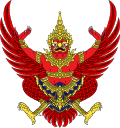Democrat party
On 29 April, party leader Abhisit Vejjajiva promised an "agenda for people", with education as the main focus. He also vowed not to privatize basic utilities like electricity and water supply and also to nationalize those enterprises which had previously been privatized. [19] However, he later backtracked and promised not to renationalize the oil and gas company PTT. [20] He also promised that core Thai Rak Thai populist policies like the 30-baht universal healthcare scheme, the Village Fund and the SML scheme would not be cancelled but improved. He later promised that Thaksin's popular 30-baht universal healthcare scheme would be abolished immediately, and replaced with a system where access to medical services would be totally free. [21] He also said that all future Democrat MPs will have to declare their assets and possible involvement in any private companies (under Thai law, only those who take a government position have to declare their assets). [22] In addition, MPs, Government ministers, and their families would also be required to disclose benefits they received from business connections. [23] He also proposed a 10 million THB limit to the amount that any individual could contribute to a political party in one year. [23] He also proposed to reduce the number of votes necessary to force a vote of no confidence to just one-tenth of the House. [23]
Abhisit also promised many populist policies, [24] including:
- Providing quality universal healthcare for no cost. The Thaksin-originated universal healthcare scheme provides coverage for 30 Baht (approx. US$0.9 ) per visit.
- Providing free education, textbooks, milk and supplemental foods for kindergartens
- Increasing the minimum wage
On the Democrat Party's 60th Anniversary dinner, Abhisit raised over THB 200 Million in funds from attendants. He outlined several energy policies [25] including:
- Increasing dividend payments from PTT and using the funds to repay Oil Fund debts
- Allowing EGAT to bear the burden of rising fuel prices, since a non SET-listed EGAT would have no minimum return on investment.
On 13 July 2006, facing escalating violence in the South, Abhisit promised to solve the insurgency by making the problems in the deep South a public agenda. [26]
In late July 2006, party leader Abhisit Vejjajiva appeared on two television advertisements. [27] The first tried to portray Abhisit as a family man, while the second suggested that people cope with the high cost of living by cutting down on energy consumption. Two additional advertisements were scheduled to air in August, the third focusing on free education, and the fourth on free health care. Prime Minister Thaksin commended the spots, and Abhisit claimed spots were well received. However, pollsters at ABAC Poll and the BU Poll Centre doubted that the spots would impress grassroots voters.
